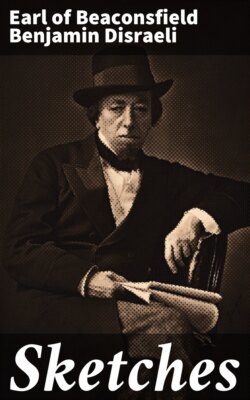Читать книгу Sketches - Earl of Beaconsfield Benjamin Disraeli - Страница 7
На сайте Литреса книга снята с продажи.
CHAPTER III.
ОглавлениеTable of Contents
Love’s Messenger
THE apprehensions of the little Theodore proved to be too well founded. On the morning after the meeting of Lady Imogene with Lord Branchimont at the shrine of Charolois, she was summoned to the presence of her father, and, after having been loaded with every species of reproach and invective for her clandestine meeting with their hereditary foe, she was confined to a chamber in one of the loftiest towers of the castle, which she was never permitted to quit, except to walk in a long gloomy gallery with an old female servant remarkable for the acerbity of her mind and manners. Her page escaped punishment by flight; and her only resource and amusement was her mandolin.
The tower in which the Lady Imogene was imprisoned sprang out of a steep so precipitous that the position was considered impregnable. She was therefore permitted to open her lattice, which was not even barred. The landscape before her, which was picturesque and richly wooded, consisted of the en-closed chase of Charolois; but her jailers had taken due care that her chamber should not command a view of the castle of Branchimont. The valley and all its moving life were indeed entirely shut out from her. Often the day vanished without a human being appearing in sight. Very unhappy was the Lady Imo-gene, gazing on the silent woods, or pouring forth her passion over her lonely lute.
A miserable week had nearly elapsed. It was noon; the Lady Imogene was seated alone in her chamber, leaning her head upon her hand in thought, and dreaming of her Lothair, when a fluttering noise suddenly roused her, and, looking up, she beheld, to her astonishment, perched on the high back of a chair, a beautiful bird-a pigeon whiter than snow, with an azure beak, and eyes blazing with a thousand shifting tints. Not alarmed was the beautiful bird when the Lady Imogene gently approached it; but it looked up to her with eyes of intelligent tenderness, and flapped with some earnestness its pure and sparkling plume. The Lady Imogene smiled with marvelling pleasure, for the first time since her captivity; and putting forth her hand, which was even whiter than the wing, she patted the bright neck of the glad stranger, and gently stroked its soft plumage.
‘Heaven hath sent me a friend,’ exclaimed the beautiful Imogene; ‘Ah! what—what is this?’
‘Didst thou call, Lady Imogene?’ inquired the harsh voice of acid Martha, whom the exclamation of her mistress had summoned to the door.
‘Nothing—nothing—I want nothing,’ quickly answered Imogene, as she seized the bird with her hand, and, pressing it to her bosom, answered Martha over her shoulder. ‘Did she see thee, my treasure?’ continued the agitated Imogene, ‘Oh! did she see thee, my joy? Methinks we were not discovered.’ So saying, and tripping along on the lightest step imaginable, the captive secured the door; then bringing forth the bird from its sweet shelter, she produced a letter, which she had suddenly detected to be fastened under its left wing, and which she had perceived, in an instant, to be written by Lord Branchimont.
Her sight was dizzy, her cheek pale, her breath seemed to have deserted her. She looked up to heaven, she looked down upon the letter, and then she covered it with a thousand kisses; then, making a vigorous effort to collect herself, she read its strange and sweet contents:—
‘Lothair to Imogene.
‘Soul of my existence! Mignon, in whom you may place implicit trust, has promised me to bear you this sign of my love. Oh, I love you, Imogene! I love you more even than this bird can the beautiful sky! Kiss the dove a thousand times, that I may steal the kisses again from his neck, and catch, even at this distance, your fragrant breath. My beloved, I am planning your freedom and our happiness. Each day Mignon shall come to tell you how we speed; each day shall he bring back some testimony of your fidelity to your own
Lothair.’
It was read—it was read with gushing and fast-flowing tears—tears of wild joy. A thousand times, ay, a thousand times, Imogene embraced the faithful Mignon; nor could she indeed have ever again parted with him, had she not remembered that all this time her Lothair was anxiously awaiting the return of his messenger. So she tore a leaf from her tablets and inscribed her devotion; then, fastening it with care under the wing, she bore Mignon to the window, and, bestowing upon him a last embrace, permitted him to extend his beautiful wings and launch into the air.
Bright in the sun glanced the white bird as it darted into the deep-blue sky. Imogene watched it until the sparkling form changed into a dusky shade, and the dusky shade vanished into the blending distance.
